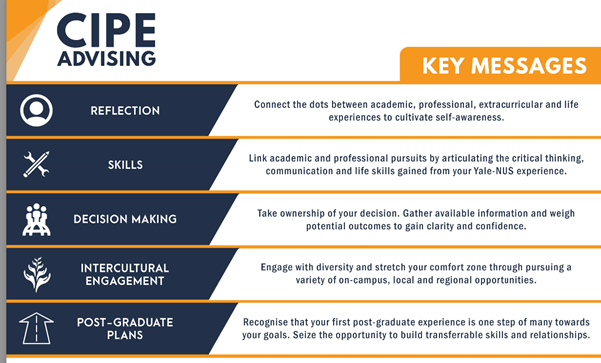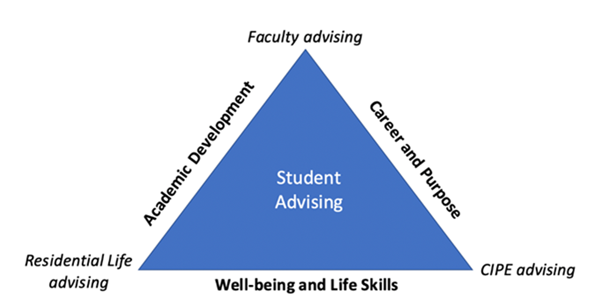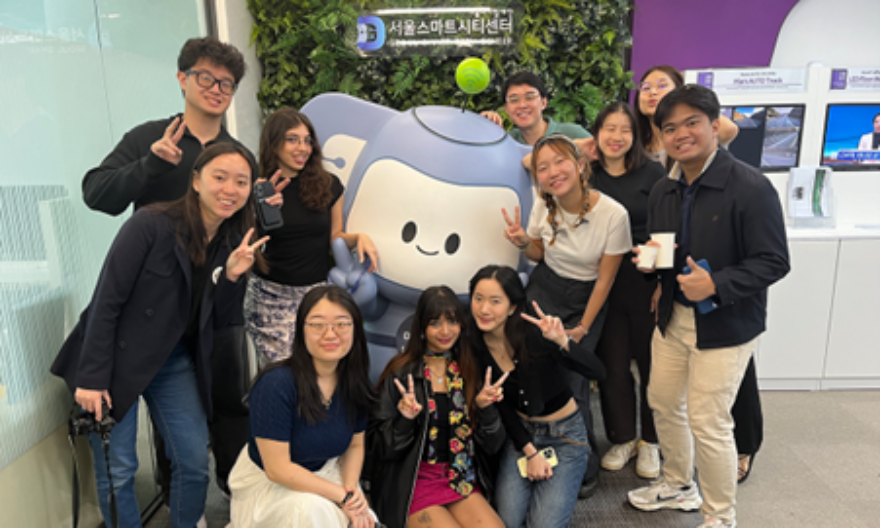The Centre for International & Professional Experience’s enhanced advising framework improves student development support
At Yale-NUS, there are many components working in tandem to ensure students have access to resources that encourage holistic and sustained development. The Centre for International & Professional Experience (CIPE) is one such key pillar in students’ personal and professional development. With their advising services, CIPE plays the crucial role of providing students with professional support and learning opportunities during their time at Yale-NUS and beyond. Recently, CIPE unveiled a new advising framework that strives to enhance the services offered to students.
To better convey the existing work of the team and the support they already provide, CIPE has developed a set of learning outcomes and key messages to offer greater clarity to students, faculty and colleagues on CIPE’s role and specific expertise.
 Key messages of CIPE’s advising framework for students. Image provided by the Centre for International & Professional Experience.
Key messages of CIPE’s advising framework for students. Image provided by the Centre for International & Professional Experience.
In addition, new frameworks and paradigms have been introduced. One such new feature is the development of language around “person-centred” and “programme-centred” advising. Programme-centred advising focuses on providing information and emphasising skill-building, and typically relates to a specific opportunity provided by CIPE. Person-centred advising, however, makes connections between CIPE opportunities and other College experiences, with a focus on setting goals, defining purpose, and developing self-authorship. While these forms of advising have always existed at CIPE, students are not as familiar with person-centred advising and need to be actively encouraged to seek it out. Another significant change is the restructuring of CIPE’s advising activities to align with key moments of a student’s undergraduate experience. Students across different years in the College are at different points of personal and professional development, and would benefit from a differentiated approach.
For example, first-year students will receive more structured, group advising that encourages them to explore their interests. Whereas for second and third-year students who are starting to specialise, CIPE will provide more intentional, targeted support around key milestones like their major declaration and decisions for study abroad. Graduating seniors will continue to receive more intensive individualised attention from a specialised group of CIPE advisors who will work with them through their senior year and after they graduate.
Director of CIPE Nilanjana Pal explained that this enhanced framework was developed after the CIPE team had accrued some experience from having a “full house of students” (across different years) for five years now, which gave the team a better understanding of the shifting needs of the student body.
CIPE also made efforts to integrate and simultaneously differentiate their advising framework from other advising channels available to students.
 The larger ecosystem of advising made available to Yale-NUS students. Image provided by the Centre for International & Professional Experience.
The larger ecosystem of advising made available to Yale-NUS students. Image provided by the Centre for International & Professional Experience.
While there are clearly demarcated roles for faculty advisors, residential life officers and CIPE advisors, there are also opportunities for overlap, which allows for more avenues for information sharing. To illustrate this, Pal shared that “although the major declaration is not under CIPE’s purview, we recognise that we can support this process. We participate in the major fairs, and share information with students about what Yale-NUS graduates in specific majors have gone on to do since graduation. We see this as a chance for us to share about the opportunities that their majors might open up for them”.
She also highlighted how CIPE works closely with the Residential Life team, which also saw some major revamps in the last academic year. The Dean of Students Office officially launched the Residential Life Curriculum to help students think through, plan, and set goals for what they might want to gain from three main components––Wellness, Intercultural Engagement, and Community Living & Engagement––during their time at Yale-NUS.
“As a fully residential campus, we recognise that a lot of the student learning comes not just from their academic study but also through cocurricular and extracurricular engagements outside the classroom. By identifying and creating on-campus opportunities that fall under this Residential Life curriculum, we hope to help students move through their time at Yale-NUS with a better sense of what they are truly interested in and how they would like to grow,” said May-Yi Shaw, Assistant Dean of Cendana Residential College.
Sharing more about the role of assistant deans within the broader student advising framework, Assistant Dean Shaw explained that her primary responsibility lies in “holistic student care and student well-being”, meaning that oftentimes she is a “one-stop service” where students can come to her to talk about anything––be it academic, personal, mental, physical, or emotional.
In sum, the recent enhanced framework unveiled by CIPE is part of the College’s continued efforts and commitment towards supporting the personal and professional needs of Yale-NUS students.





